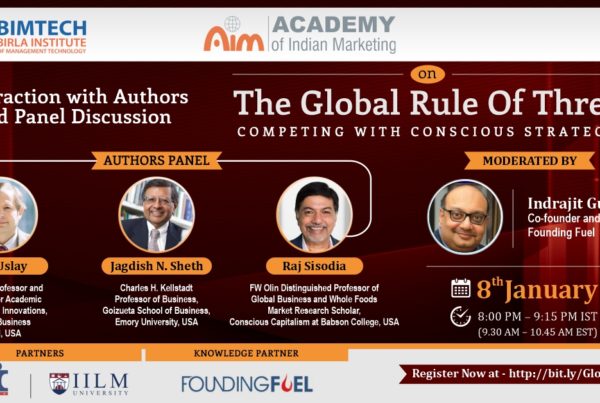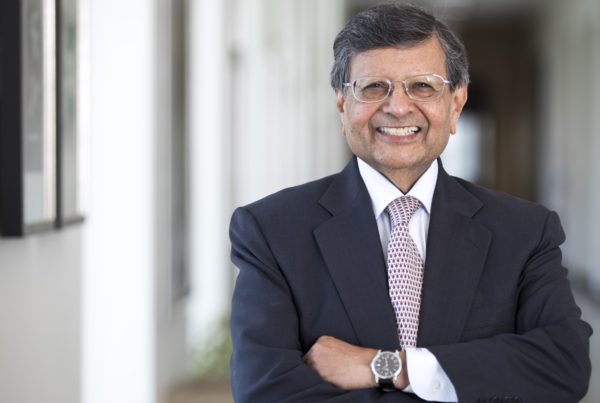Published: Jun 23, 2006 in Knowledge@Emory
School may be out for the summer but professors at Emory University and its Goizueta Business School have plenty of ideas for extracurricular reading. From evolution to economics, the academics offer up a variety of favorites to stimulate all palates.
Although you may not think of economics as an exciting topic for summer reading, Al Hartgraves, a professor of accounting at Goizueta, is among the many who recommend Freakonomics, a book by University of Chicago economist Steven Levitt and Stephen Dubner, a former writer and editor for the New York Times Magazine (Morrow, 2005).
“It is a book written by a very highly regarded scholar who takes a look at a weird combination of social and economic issues (ranging from the economics of drug dealing, the falling crime rate in the 90s, real estate agent biases, parenting, and why people are often not entirely honest) without burdening the reader with a lot of academic analysis and jargon—but with enough data to persuade the reader that he has done his homework,“ notes Hartgraves. “It’s an easy read—just the kind of book you would want to take on vacation.”
Emory economist Hashem Dezhbakhsh is also a fan of Freakonomics. “The authors explain how the analytical tools used by economists can be applied to answer many interesting questions outside the mainstream of economics. In the process they uncover all kinds of fascinating truths,” he observes.
One of this year’s most popular recommendations is New York Times’ columnist Thomas Friedman’s latest book on globalization and its discontents, The World is Flat: A brief history of the twenty-first century (Farrar, Straus and Giroux: 2005).
“It offers a very interesting perspective on the increasingly level playing field between advanced countries and emerging countries such as India,” says Jagdish Sheth, a professor of marketing and corporate strategist at Goizueta whose work also often touches on issues of globalization.
Deborah Valentine, a senior lecturer in management communication and a specialist in cross-cultural communication, and Richard Metters, a professor of decision and information analysis whose own research often explores the challenges and opportunities created by global supply chains, are also fans of Friedman’s tome. “This book is of interest to those who are concerned about the globalization and offshoring of services,” notes Metters.
Economic influences continued with Emory’s Robert Chirinko, a professor of economics, recommendation of Robert Shiller’s The New Financial Order (Princeton, 2004). Shiller is the Yale University economist who wrote Irrational Exuberance, a book that successfully predicted the NASDAQ crash. Shiller’s current book discusses today’s largest macroeconomic risks from, among other factors, housing prices, and how policymakers can deal with them, says Chirinko.
Marc Gunther’s Faith and Fortune: The quiet revolution to reform American business (Crown Business, 2004) also made Chirinko’s list. Written by a Fortune magazine writer, Chirinko says the book “looks at alternative governance arrangements among stakeholders that seek to enhance performance.” Gunther, according to Booklist, profiles such companies as toothpaste manufacturer Tom’s of Maine and the Timberland boot company as examples of firms that are “promoting socially conscious ideals and succeeding at it.”
For readers who want a break from forecasts about the competitive future, a book on how much of life is entirely random may allow you to enjoy your summer more easily. Finance professor Nicholas Valerio recommends Fooled by Randomness: The hidden role of chance in the markets and in life by Nassim Nicholas Taleb, a professor in the science of uncertainty at the University of Amherst (2nd Ed., New York and London: Thomson Texere, April 2004).
“We are often victims of our own biases that lead us to attribute random outcomes to determinism. This book is about how we understand and deal with luck, and often mistake it (when it is good luck!) for skill,” writes Valerio. “The author’s domain is the financial markets, but he is a true Renaissance man and the lessons he presents in this book are drawn from the arts and sciences as well as mathematics and finance. These lessons are vital for anyone who deals with risk in life (i.e., everyone!).”
Women not ready to chalk everything up to randomness may want to look at a how-to business career guide recommended by Susan Gilbert, a finance professor and director of the Evening MBA Program at Goizueta. Gilbert suggests Play Like a Man, Win Like a Woman, by Gail Evans (Broadway, 2000) the first female vice president at CNN/Turner, who “shares many personal experiences about her rise up the ladder and offers useful insights to women at various stages of their careers.”
“Many women about to enter business school are unaccustomed with being in the minority,” writes Gilbert. “…This book may help MBA candidates develop a communication style and career management strategy that is gender neutral, and may shape how they participate in teams, lead others, interact with peers and authority figures, and prepare to re-enter the workforce.” And don’t forget to bring along “As always, I am a great fan of The Economist magazine.”
Of course, there are other ways to get an edge. Political science professor Dan Reiter recommends Moneyball: The art of winning an unfair game (W.W. Norton, 2003), by author Michael Lewis about Billy Beane, general manager of Major League Baseball’s Oakland A’s, whose insights into player’s statistics allowed him in 2002 to build one of the most successful teams in the big leagues in spite of having the lowest salary budget. “It’s all about exploiting market imperfections to maximize marginal return, applied to major league baseball,” Reiter says.
Paul Rubin, a professor of law and economics at Emory, suggests several books that also look at misunderstandings of various kinds. At the top of his must-read list is a book by Peter W. Huber and Mark P. Mills, called The Bottomless Well: The twilight of fuel, the virtue of waste, and why we will never run out of energy (Basic Books, 2005). Rubin says the book puts the long-term health of the energy market in perspective.
Huber and Mills argue that the world actually isn’t running out of energy. “Everything we think we know about `running out of energy’ isn’t just muddle-headed and wrong; it’s the exact opposite of the truth,” they write. The two note that over the past two centuries of industrial development, the technology to find and extract fuels has grown faster than the need.
Of Preventing Surprise Attacks (Rowman and Littlefield, 2005), by Richard Posner, Rubin says, “a really smart man discusses intelligence reform.” Posner, a judge at the U.S. Court of Appeals in Chicago, argues that the 9/11 Commission made a mistake in its recommendation that U.S. intelligence needs to be more centralized in order to avoid surprise attacks in the future.
Posner’s argument, as outlined in a 2004 New York Times book review of the 9/11 Commission’s published report, is first, that it’s essentially impossible to guard against something that hasn’t happened before, and second that the commission’s remedy—consolidating intelligence services under a single leader—is likely to lead to less competition among agencies, less diversity of views, and ultimately a weaker intelligence system.
Accounting professor Sudipta Basu, a voracious reader, offers a list of books from traditional business to alternative Harry Potter. In The (Mis)Behavior of Markets: A fractal view of risk, ruin, and reward, by Benoit Mandelbrot and Richard L. Hudson (Basic Books, 2004), Basu says that mathematician Benoit Mandelbrot, the father of fractals and chaos theory, disproves the random walk theory of stock prices—the idea that underlies index funds and much modern, conservative investing theory.
Mandelbrot, Basu says, “shows the lay reader how the random walk theory just does not describe the behavior of stock prices. He first plots actual stock prices, and then shows how the random walk process assumed in standard finance theory does not produce graphs that look like actual stock price behavior. He then describes alternative models that do produce graphs that look like actual stock prices, and draws lessons for both finance professionals and lay investors. The key message is that markets are far riskier than we have been led to believe.”
Economist Paul Seabright’s The Company of Strangers: A natural history of economic life (Princeton University Press, 2004), also made Basu’s list. “Adam Smith pointed to division of labor as the source of economic development. Perhaps uniquely in the animal kingdom, humans have developed ways for strangers to cooperate, enabling gains from trade. Seabright combines evolutionary ideas from biology, psychology and economics to explain the institutions humans have created that enable this momentous achievement. Modern businesses are one of the institutions surveyed in this helicopter view of human development,” Basu writes.
He also recommends The Gifts of Athena: Historical origins of the knowledge economy by Joel Mokyr (Princeton, 2002). Mokyr offers an historical overview of institutions that have helped generate, develop and accumulate knowledge, focusing on the causal relations between technological change, innovation and economic growth. “The book provides powerful lessons on how to spread and preserve knowledge within organizations,” Basu notes.
For another angle at a related topic, how much human development is owed to culture rather than genetics, Basu recommends Peter J. Richerson and Robert Boyd’s, Not by Genes Alone: How culture transformed human evolution, (Chicago, 2005). Basu describes it as a “provocative layman’s summary of over 30 years of research, making the startling argument that culture has had a greater influence than genetics on human evolution and development over the last 10,000 years of human existence. Just as Darwin’s biological evolution helps us understand why some species thrive and others die out, the new cultural evolution helps us understand why some tribes, races, cultures, civilizations have survived and thrived while others have not. A bold synthesis of social science and hard sciences that changes how you see the people around you.”
On the political end, Basu recommends a revisionist look at the economic policies of President Franklin D. Roosevelt in FDR’s Folly: how Roosevelt and his New Deal prolonged the Great Depression (Random House, 2003).
Author Jim Powell “surveys FDR’s policies from an economic perspective, and shows that FDR’s anti-business policies and attempts to buy votes in Western states not only prolonged the Great Depression, but actually made the poor worse off. [The book] came out too late to save us from Sarbanes-Oxley, but shows that `a little knowledge is a dangerous thing,’ especially when we talk of politicians,” Basu says.
Of course, for millions of kids under the age of 14, the only knowledge they’re concerned about gaining right now is what’s behind the title page of J.K. Rowling’s new Harry Potter book, the 672-page Harry Potter and the Half-Blood Prince, which is due out not a minute before midnight, July 16. Basu recommends these fantasy authors for readers of all ages:
If you thought the Harry Potter books were badly written and unimaginative, Basu suggests the “thinking child’s Harry Potter” books… Philip Pullman’s His Dark Materials trilogy: The Golden Compass, The Subtle Knife, and The Amber Spyglass (Alfred A. Knopf).
For those who thought the Harry Potter books were too long and too slow, try Eoin Colfer’s Artemis Fowl series: Artemis Fowl, The Eternity Code, The Arctic Incident, and The Opal Deception (Hyperion Books).





